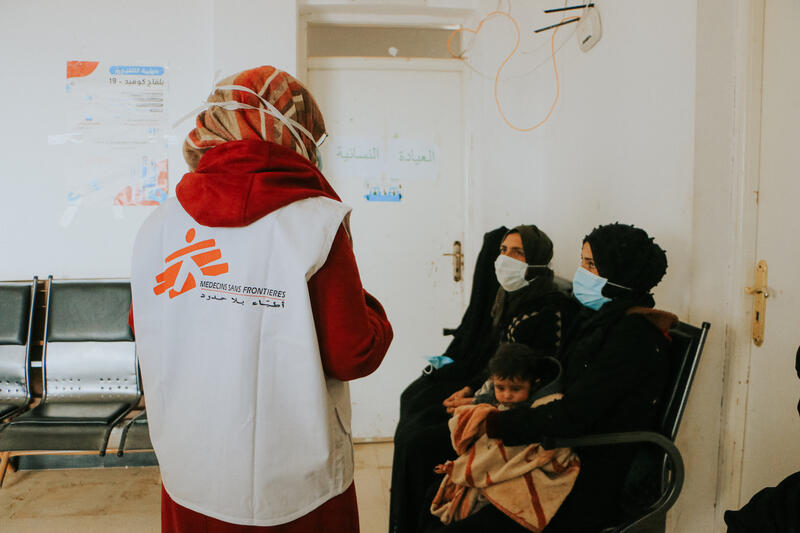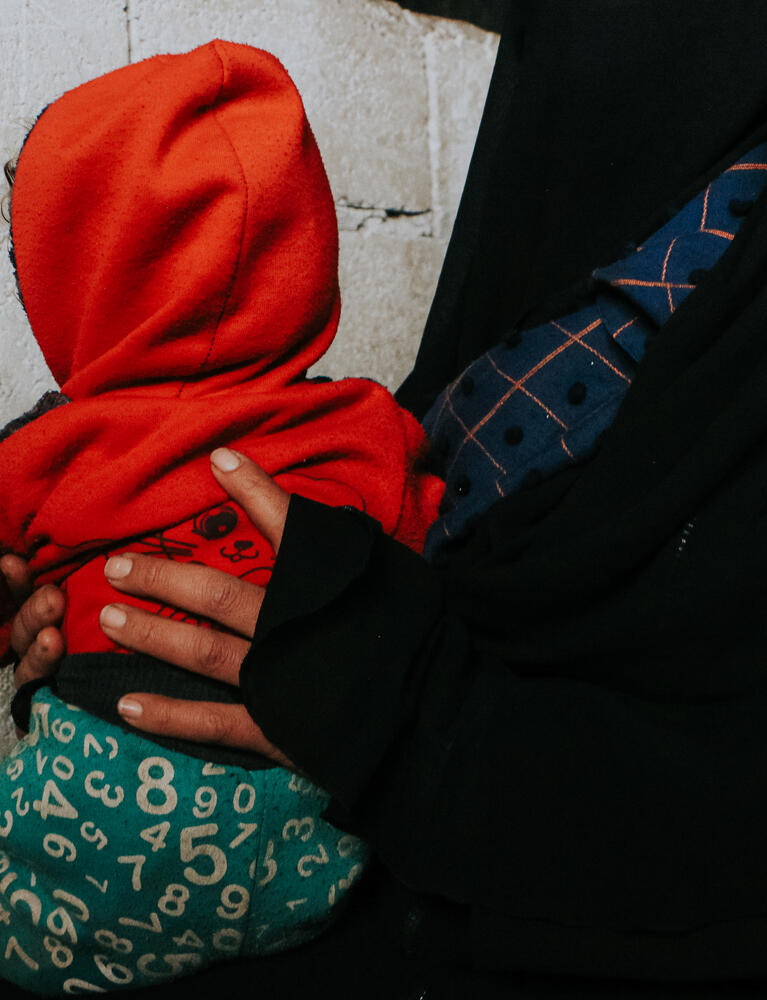On a cold rainy day, a woman arrives with her husband on a motorcycle at an MSF-supported hospital in Idlib governorate, in northwest Syria. She is here to give birth. Ratiba, a displaced mother of four, three of whom were born during the Syrian conflict, raises her children under a tent and struggles to make ends meet. Like thousands1 of women in Syria, she was diagnosed with malnutrition during her pregnancy. As a result, she said she suffered from ‘continuous dizziness, hypertension and fatigue'.
Ratiba is not alone in her predicament. Today, northwest Syria is home to 4 million people, including 2.7 million internally displaced, 80 per cent of whom are women and children. For more than a decade, MSF has witnessed first-hand how women – as the rest of the population – have been directly impacted by the conflict and its consequences. Many live in poor conditions and suffer from food insecurity2. Existing challenges such as gender-based violence and early marriage further compound women’s vulnerabilities. “Even the normal stages in a woman’s life, such as menstruation, pregnancy, or breastfeeding, become a complex burden”, says, Teresa Graceffa, Medical Coordinator for MSF in Syria.

Access to healthcare is another huge challenge due to insecurity, long distances to health facilities and the cost of services and transportation. "A woman coming from afar recently gave birth near the entrance of an MSF-supported hospital,” said Caroline Masunda, Medical Referent for MSF in Syria. She was waiting for enough money to pay for transportation, as there was no ambulance available. This is concerning as late arrivals for delivery could lead to medical complications for both the mother and the baby."
Eleven years of war have also taken a toll on women’s mental health, and many are struggling with anxiety, depression or post-traumatic stress disorder. Most women and teenage girls who receive psychological support in MSF facilities say that their distress is directly or indirectly related to the conflict. “I recently referred a 25-year-old displaced mother of five to a mental health specialist because she presented symptoms of depression. She was so overwhelmed with sadness that she could no longer breastfeed her newborn child,” says Soumaya*, an MSF health promoter.
MSF has been offering sexual and reproductive health (SRH) services to women in northwest Syria since 2012. This includes prenatal, postnatal and newborn care; management of deliveries including C-sections; gynecological consultations, family planning and mental health support. In 2021, we assisted over 18,000 deliveries in Aleppo and Idlib governorates and provided more than 200,000 SRH consultations, through co-managed and supported hospitals, health centers and mobile clinics.
While humanitarian needs continue to grow, the fragile health system in northwest Syria faces structural challenges and funding gaps remain a major challenge.
In the displacement camps that MSF teams visit, women regularly express concerns about the decreased availability of maternal and childcare services. “Every time we head to the nearby hospital, we see fewer doctors and nurses, and most services are often unavailable,” says Fatima*, a mother of seven, who recently experienced a miscarriage. “I learnt that the hospital in which my daughter was born is now closed,” she adds.
Over the last year, MSF has seen various health facilities and projects downscale their activities or close after losing their funding. In addition, during the conflict, hundreds of medical facilities have been damaged or destroyed. Many medical staff have been killed or have fled the country. Essential medicine and medical supplies are often unavailable. All of this has negatively impacted the access to essential services for pregnant women, girls and their newborns.
As a response, MSF stepped up its activities to respond to a 50% increase of deliveries in three of its co-managed hospitals, where C-section deliveries also tripled in 2021. This increase continued in the first two months of 2022.
It is clear that the humanitarian response does not match the needs, and there is an urgent need to increase funding for lifesaving activities, including SRH services in the country. “Women in northwest Syria need long-term quality provision of sexual and reproductive health services to have a chance to lead healthy lives. Now is certainly not the time to let them down,” says Dr Faisal Omar, MSF head of mission for Syria.
*Names have been changed to protect identity
In northwest Syria, MSF is currently supporting 7 hospitals including 1 burn unit, in addition to 12 Primary Health Care centres (PHCs) and 3 ambulances for referrals. In addition, MSF supports 11 mobile clinics serving Internally Displaced People (IDP) camps. MSF is also running Water, Sanitation and Hygiene (WASH) activities in close to 100 IDP camps across the northwest.
In northeast Syria, MSF provides vaccination support in across 12 locations. It runs a primary healthcare clinic, a NCDs programme, mobile wound care, and a reverse osmosis plant to provide safe drinking water in Al-Hol. MSF also runs two NCDs clinics and provides primary health care services, including tuberculosis care inside a Detention Centre. Furthermore, MSF supports a hospital, as well as an outpatient department (OPD) which includes an ER, and it has launched a nutrition programme.
Eleven years of war in #Syria have taken a toll on women’s health!
— MSF Syria | أطباء بلا حدود سوريا (@MSF_Syria) April 5, 2022
?Thousands live in precarious conditions
?Many struggle to access healthcare
?Many suffer from food insecurityhttps://t.co/WxnemqiHC9



